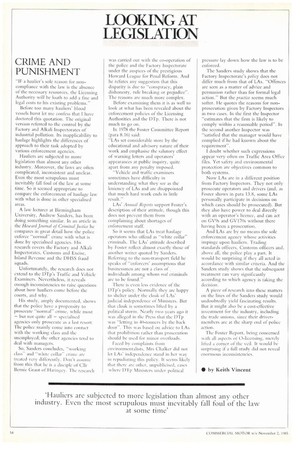LOOKING AT LEGISLATION
Page 56

If you've noticed an error in this article please click here to report it so we can fix it.
CRIME AND PUNISHMENT
"IF a haulier's sole reason for noncompliance with the law is the absence of the necessary resources, the Licensing Authority will be loath to add a fine and legal costs to his existing problems."
Before too many hauliers' blood vessels burst let me confess that I have doctored this quotation. The original version referred to the control by the Factory and Alkali Inspectorates of industrial pollution. Its inapplicability to haulage highlights the differences of approach to their task adopted by various enforcement agencies.
Hauliers are subjected to more legislation than almost any other industry. Moreover, the laws are often complicated, inconsistent and unclear. Even the most scrupulous must inevitably fall foul of the law at some time. So it seemed appropriate to compare the enforcement of haulage law with what is done in other specialised areas.
A law lecturer at Birmingham University, Andrew Sanders, has been doing something similar. In an article in the Howard Journal of Criminal Just fce he compares in great detail how the police enforce "normal" crime with what is done by specialised agencies. His research covers the Factory and Alkali Inspectorates, Customs and Excise, Inland Revenue and the DHSS fraud squads.
Unfortunately, the research does not extend to the DTp's Traffic and Vehicle Examiners. Nevertheless, it reveals enough inconsistencies to raise questions about how hauliers come before the courts, and why.
His study, amply documented, shows that the police have a propensity to prosecute "normal" crime, while most — hut not quite all — specialised agencies only prosecute as a last resort. The police mainly come into contact with the working class and the unemployed; the other agencies tend to deal with managers.
So, Sanders concludes, "working classand "white collarcrime arc treated very differently. Don't assume from this that he is a disciple of Cllr Bernie Grant of Haringey. The research
was carried out with the co-operation of the police and the Factory Inspectorate under the auspices of the prestigious Howard League for Penal Reform. And he refutes any suggestion that this disparity is due to "conspiracy, plain dishonesty, rule breaking or prejudice". The reasons are much more complex.
Before examining them it is as well to look at what has been revealed about the enforcement policies of the Licensing Authorities and the DTp. There is not much to go on.
In 1978 the Foster Committee Report (para 8.16) said: "LAs set considerable store by the educational and advisory nature of their work and emphasise the salutory effect of warning letters and operators' appearances at public inquiry, quite apart from any penalty imposed.
"Vehicle and traffic examiners sometimes have difficulty in understanding what they see as the leniency of LAs and are disappointed that much hard work ends in little result."
LAs' Annual Reports support Foster's description of their attitude, though this does not prevent them from complaining about shortages of enforcement staff.
So it seems that LAs treat haulage operators who offend as "white collar" criminals, The LAs' attitude described by Foster reflect almost exactly those of another writer quoted by Sanders. Referring to the non-transport field he speaks of "enforcers' assumptions that businessmen are not a class of . individuals among whom real criminals are to be found."
There is even less evidence of the DTp's policy. Normally they are happy to shelter under the cloak of LAs' judicial independence of Ministers. But that cloak is sometimes lifted by a political storm. Nearly two years ago it was alleged in the Press that the DTp was "letting in 40-tonners by the back door". This was based on advice to LAs that prohibition rather than prosecution should be used for minor overloads.
Faced by complaints from environmentalists, Mrs Chalker did not let LAs' independence stand in her way in repudiating this policy. It seems likely that there are other, unpublicised, cases where DTp Ministers under political pressure lay down how the law is to be enforced.
The Sanders study shows that the Factory Inspectorate's policy does not differ much from that of LAs. "Offences are seen as a matter of advice and persuasion rather than for formal legal action." But the practice seems much softer. He quotes the reasons for nonprosecution given by Factory Inspectors in two cases. In the first the Inspector "estimates that the firm is likely to comply within a reasonable period". In the second another Inspector was "satisfied that the manager would have complied if he had known about the requirement".
I doubt whether such expressions appear very often on Traffic Area Office files. Yet safety and environmental protection are objectives common to both systems.
Now LAs are in a different position from Factory Inspectors. They not only prosecute operators and drivers (and, as Foster shows in para 13.8, some LAs personally participate in decisions on which cases should be prosecuted). But they also have power to deal directly with an operator's licence, and can act on GV9s and GV171Is without there having been a prosecution.
And LAs are by no means the sole enforcement agency whose activities impinge upon hauliers. Trading standards officers. Customs officers and, above all, the police play a part. It would be surprising if they all acted in accordance with similar criteria. And the Sanders study shows that the subsequent treatment can vary significantly according to which agency is taking the decision.
A piece of research into these matters on the lines of the Sanders study would undoubtedly yield fascinating results. But it might also be a cost-effective investment for the industry, including the trade unions, since their drivermembers are at the sharp end of police action.
The Foster Report, being concerned with all aspects of 0-licensing, merely lifted a corner of the veil. It would be surprising if a full study did not reveal enormous inconsistencies.
• by Keith Vincent












































































































